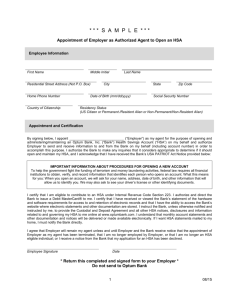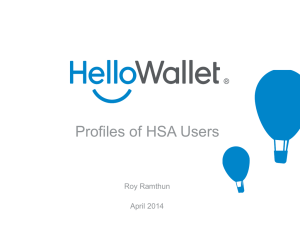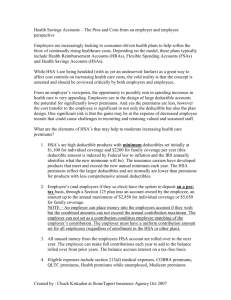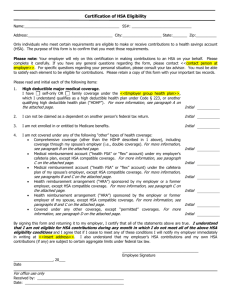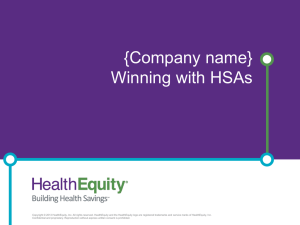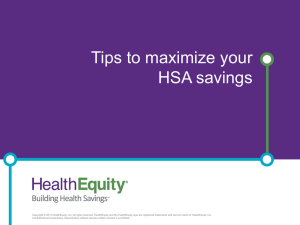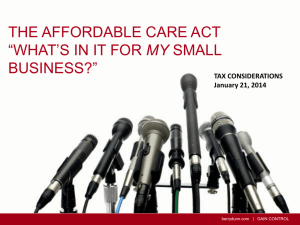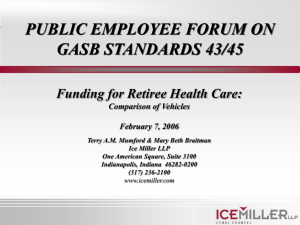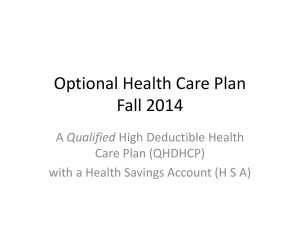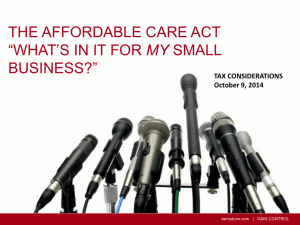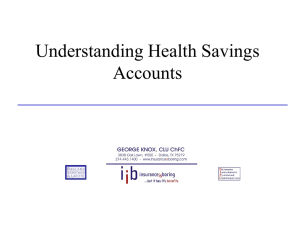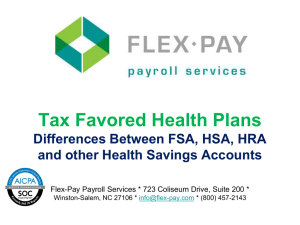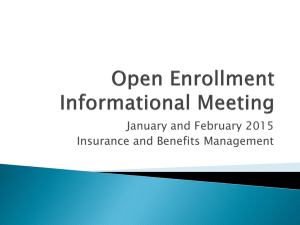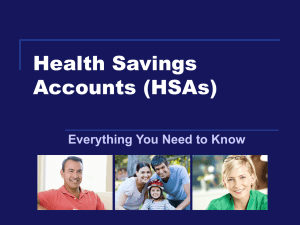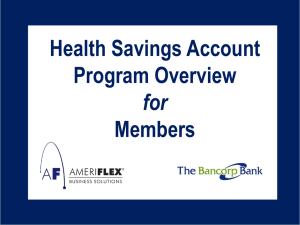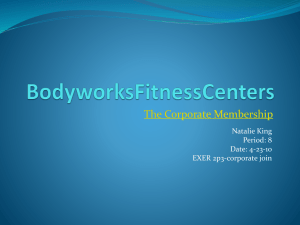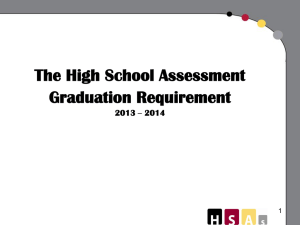Implement a Successful Program
advertisement
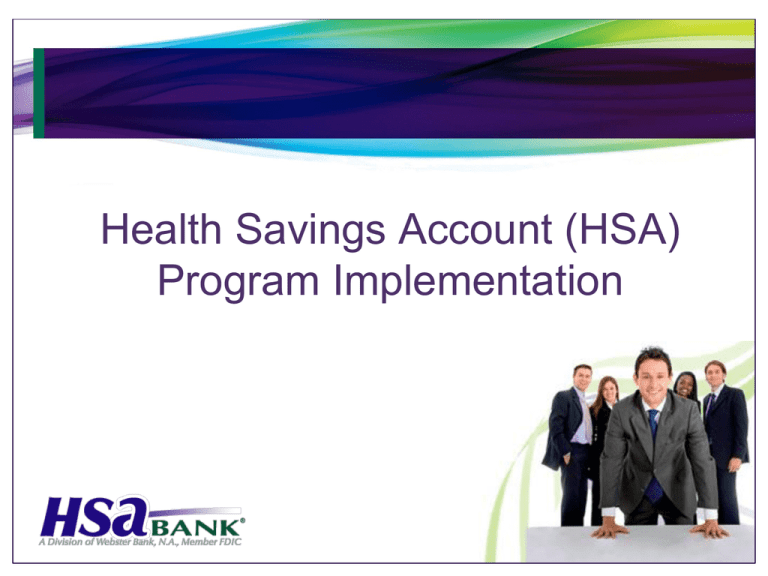
Health Savings Account (HSA) Program Implementation Implement a Successful Program • Set Goals and Establish Program Design • Educate Employees • Facilitate Enrollments and Contributions • Provide Ongoing Resources and Encourage Participation Set HSA Goals Determine what your company wishes to achieve. • Premium savings • Savings on payroll taxes with pre-tax contributions • Employee recruitment with high-quality benefits • Improved employee health • Reduced health insurance claims • Reduced sick time • Improved employee morale Establish HSA Program Design • Make program attractive and increase enrollment potential with: – Initial employer funding – Pre-tax payroll deductions – Premium cost sharing between employer and employee – Matching contributions with a Section 125 Cafeteria Plan – Incentivize healthy living, like the completion of a health risk assessment, with HSA contributions. Utilize the Employer Communication Kit • Utilize the Employer Communication Kit: – Review relationship and employer instructions and program design tips – Provide Pre-enrollment employee materials • As indicated in the communication calendar – Forward enrollment instructions to employees – Offer continuing education materials to employees throughout the year • Refer to the communication calendar for timeline Educate Employees Communicate Key Messages – – – How an HSA works Benefits of an HSA Health plan terms • • • • – Deductible Out of pocket Co-insurance Eligible Medical Expense Contribution terms • • • Pre-tax Tax-deductible Tax-deferred Explain How an HSA Works Part 1 Health Savings Account (HSA) Use to pay qualified out-ofpocket expenses not covered by the health plan, such as services applied to the deductible, dental and vision costs. Part 2 HSA-Compatible Health Plan Intended to cover medical expenses after the deductible is met. After your maximum out-of-pocket is reached, all eligible expenses are covered at 100%. HSA Concept Convey Employee Advantages • Funds roll over from year to year – Differs From typical Flexible Spending Accounts (FSAs) and Health Reimbursement Accounts (HRAs) • Triple tax benefit - Account contributions, earnings and qualified distributions are all tax-exempt • Portability – Tax-free withdrawals for Qualified Medical Expenses even if qualifying coverage ends – Potential to use like an IRA for an added retirement benefit • Long-term investment opportunities (Not FDIC insured) • Control over healthcare dollars Provide Learning Opportunities • Schedule employee meetings – View HSA Bank’s pre-enrollment presentation – Email, post or provide employee information as outlined in the Communication Calendar – Allow your employees’ spouses to attend • Direct employees to savings and decision tools – http://www.hsabank.com/HSABank/Accountholders/Calculator.aspx • Communicate employer contribution amount • Identify premium savings, company portion Dispel HSA Myths • HSAs are for the healthy and wealthy. – Traditional plans do not typically limit out-of-pocket expenses while HSA-compatible plans generally cover expenses at 100% after the maximum and provide certain preventive care services before the deductible is met. • HSAs only shift costs from employers to employees. – HSA plans may allow employers to offer healthcare coverage that might otherwise be too expensive. – Employees typically save on premiums. – Employer contributions provide funds for employees to use or save for the future. – HSAs have a triple tax benefit for added employee savings. Facilitate Enrollments and Contributions Forward Enrollment Materials • Email your custom Group Online Enrollment (GOE) link and enrollment instructions to your employees. – Your custom link is located in the enrollment section of the Employer Administration Area. – The Employer Communication Kit can be downloaded from the Resources section of the Employer Administration Area. Monitor Enrollments • If you chose Post Approval enrollment, you will need to log in to the Employer Administration Area and approve applications before they can be processed. Refer to your Employer Manual for details. • If you chose Pre-Approval, you will need to upload an employee census file prior to the enrollment period. Census file templates are available on HSA Bank’s Employer Administration Area. Contribute – Set up a pre-tax Section 125 Cafeteria Plan • Communicate matching employer contributions • Forward the salary deduction form to employees – Sign up for Group Online Contributions (GOC) (separate sign-up form required) or – Work with Business Relations to set up electronic employer contributions. Provide Ongoing Resources and Encourage Participation Highlight Support & Resources • Communicate Resources Provided by HSA Bank – Tax documents – Ongoing educational resources • Found in Employer Communication Kit – www.hsabank.com • HSA Education, FAQs – Around the clock account access • Internet Banking, Bankline – Exceptional customer service • Toll-free (800) 357-6246 M – F, 7 a.m. – 9 p.m., CT • Email – askus@hsabank.com • Secure website contact form https://secure.hsabank.com/contactus/contactus.aspx Implement Wellness Program • Wellness programs typically improve employee health and reduce claims. – Consider HSA Contribution incentives for: • • • • Health risk assessments Documented exercise Smoking cessation program completion Weight management program participation Review Your Program Annually • Review HSA Bank materials to determine if changes could enhance your program • Repeat employee education for new enrollees as well as those continuing in the program Thank You Thank you for entrusting HSA Bank with your HSA Administration. We are dedicated to helping you achieve your HSA program goals. Please contact our dedicated Business Relations Coordinators if you have questions or need assistance. (866) 357-5232, M-F, 7 a.m. – 7 p.m., CT businessrelations@hsabank.com
